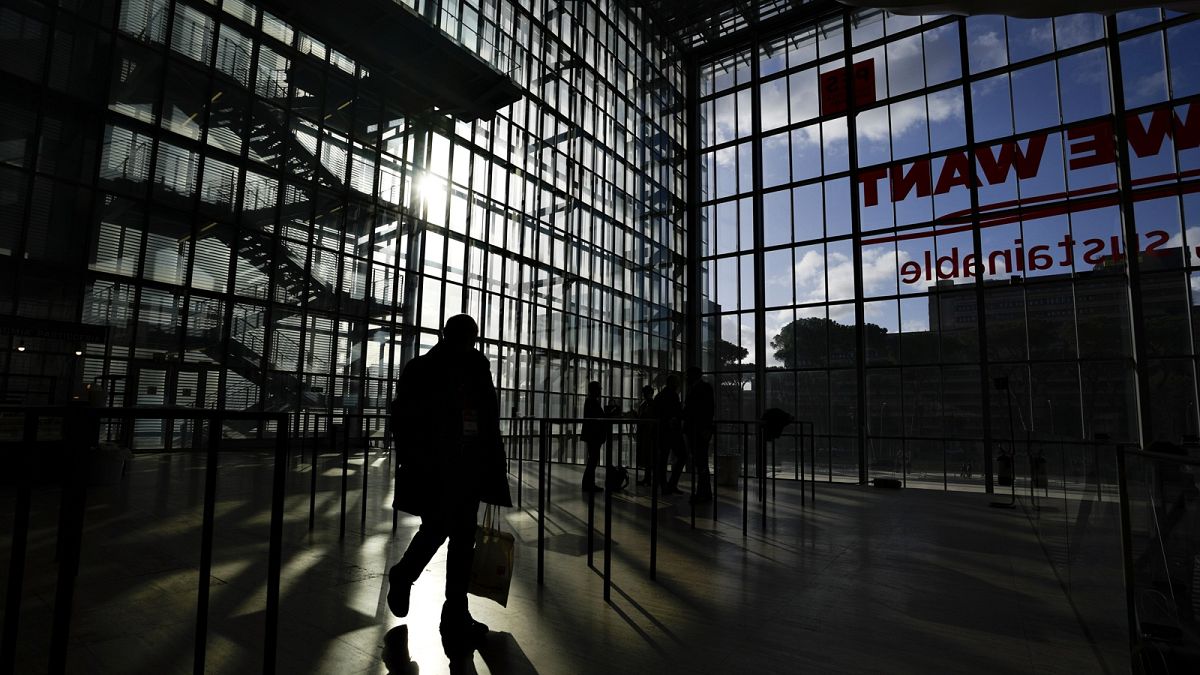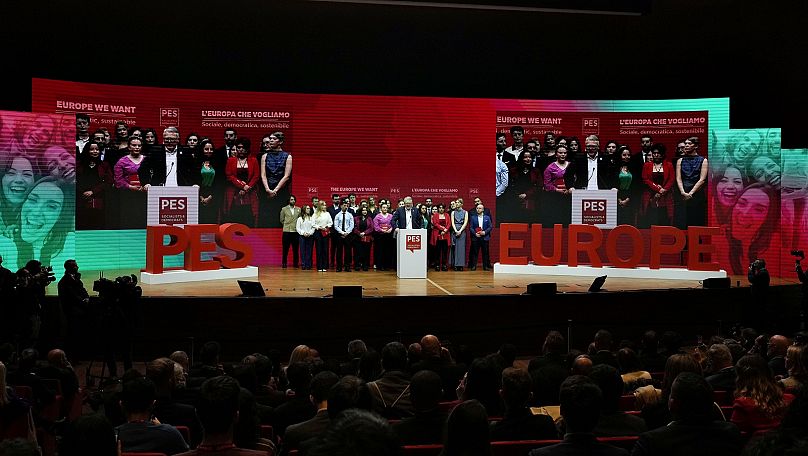Rome was more than a stunning background for the Party of European Socialists (PES) as they gathered for their congress ahead of the June elections.
On paper, the two-day meeting over the weekend was designed to extol the chief achievements of social democracy over the past five years, parade a succession of high-profile leaders and designate a lead candidate for the continent-wide polls.
The lucky one was Nicolas Schmit, a relatively unknown figure who led the internal race uncontested. His credentials as European Commissioner for Jobs and Social Rights were convincing enough to earn him an election by acclamation.
"Comrades, we have a project of hope, of progress, of justice and shared prosperity. I'm ready to lead our political family to defend our ideas," Schmit told the audience. "I'm counting on your support and you can count on mine."
Then, referring to the recent victory of the centre-left in Sardinia, Schmit concluded: "È vero, il vento sta cambiando! Andiamo a vincere queste elezioni!" ("It's true, the wind is changing! Let's go win these elections!")
But the effusive proclamations and galvanising speeches belied a feeling of insecurity and dread that pervaded the congress, from the side events that kicked off the weekend to the big, splashy occasion at the modernist convention centre of La Nuvola.
Virtually all the representatives who came on stage, including the invited heads of governments, took the opportunity to issue a stark warning about the rise of right-wing populism all across Europe, creating the impression of a leitmotif.
The fears stem from opinion polls that predict a significant boost for the European Conservatives and Reformists (ECR) and Identity and Democracy (ID) groups, whose hard-line views on political integration, climate change, asylum policy, social rights, rule of law and foreign affairs put them directly at odds with progressives.
It was therefore unsurprising that one of the first things Schmit did after his acclamation was to rule out – in unambiguous terms – any possible cooperation with the right-wing ECR and ID groups after the elections. "Not now, not ever," he said, prompting applause.
Socialists, though, are not exclusively preoccupied with the ascent of these two groups. What really fuels their anxiety is the shifting attitude of the centre-right European People's Party (EPP), the largest formation in the European Parliament. In their view, the EPP is drifting away from its long-time position of pragmatic Europeanism and gradually embracing far-right talking points for purely electoral purposes.
Rome, they said, is the undisputable evidence of the transmutation: Italy is today governed by an alliance between Fratelli d'Italia (ECR), Lega (ID) and Forza Italia (EPP), which analysts have described as the most hard-right in the country's post-WWII history.
This three-party arrangement, socialists warned, might very well be replicated in other European countries, making it impossible for citizens to discern where the centre-right ends and where the far-right starts. Finland and Sweden have too blurred the line, while the Netherlands, a socially liberal country, is staring down at what would be its first-ever executive led by a far-right politician, Geert Wilders.
Iratxe García Pérez, the leader of the Socialists and Democrats (S&D) in the European Parliament, did not pull any punches at the congress as she delivered attack after attack against the EPP, with whom she has worked closely for the past five years to sustain a grand coalition that also includes the liberals of Renew Europe.
"We know where we are. We're keeping the same position. Who moved during the last years was the EPP, they broke the traditional alliance and started to work with populists and the extreme right," García Pérez said on Friday in a briefing with journalists.
"Italy is a clear example of how conservatives are starting to normalise the alliance with the far right. This is a real danger."
García Pérez's briefing was followed by an event titled "Understanding right-wing populism and what to do about it" which examined the phenomenon for over two hours at the headquarters of the Partito Democratico (PD). The following day, PES President Stefan Löfven doubled down on the message, urging his colleagues to regard the Benito Mussolini legacy in Rome as a reminder that "politics always have to be about people and never about grandstanding or personal gain."
"To normalise the far right is, in practise, to endanger everything we have built together," Löfven said, name-checking the EPP and the liberals.
"You cannot be pro-European and democratic and, at the same time, do agreements with parties that are fundamentally anti-EU," he went on. "The PES red line is clear. We will never cooperate with ECR and ID. We will never cooperate with Alternative für Deutschland, PiS, Vox. We will never cooperate with extremist leaders."
The missing name
Amid this changing political landscape, can social democracy find its place? This was the other side of the question that socialists attempted to spell out in the Eternal City.
Their responses converged in a resounding "yes, it can" as they went through a detailed catalogue of recent policy accomplishments, including a directive to ensure minimum wages are set at adequate levels, new rules to ensure gender balance on corporate boards, fiscal support for vulnerable households to cope with the energy crisis, the €100-billion programme to finance short-time work schemes during the COVID-19 lockdowns, and the joint procurement of life-saving vaccines.
Thanks to its classic defence of labour rights, fair taxation, public services and inclusive growth, participants said, social democracy can and should be the right answer to the concerns and grievances that are driving the widespread rise of far-right parties.
The congress, however, did not explain why socialist initiatives aimed at easing economic inequality and working-class hardship had failed to contain the popular malaise. Instead, leaders blamed the extreme right for polarising the political debate, dividing societies and advertising projects that are unfeasible and irresponsible.
"Our main task as socialists and democrats is to fight populism by tackling its deep causes. Populism is fuelled by fear," said António Costa, Portugal's prime minister.
"We must provide our citizens with trust, with confidence and with certainty to build the Europe we want," he went on. "A social, democratic and sustainable Europe."
His Spanish counterpart, Pedro Sánchez, whose appearance drew loud applause, dismissed doomsayers and said social democracy had been the inspiration behind the main policy responses given to the back-to-back crises of the past few years, proving the ideology was still fit for purpose in the 21st century.
"Once again, it was the social democratic ideas that saved us. It was the welfare state and the solidarity among people that allowed us to overcome those terrible challenges and move forward," Sánchez said. "Now the same who said that we had no future are trying to recover a past that never existed."
But the celebratory claims made by socialists had an easy-to-spot flaw: the person who has spearheaded these transformational policies is not a socialist but a conservative.
It was Ursula von der Leyen, the president of the European Commission, who introduced the European Green Deal, the €750-billion recovery fund, the common purchases of vaccines and natural gas, emergency regulations to cushion record-high energy bills, and ground-breaking laws to rein in Big Tech power, crack down on unlawful content and ensure artificial development follows human-centric, ethical standards.
Von der Leyen's name was conspicuously absent at the congress in Rome for the one essential reason that she is running as the EPP's lead candidate, meaning she is bound to face off against her underling, Nicolas Schmit. The race will be deeply uneven, as the president has built on her policies to promote a legacy narrative and stress the need for strong, proven leadership in times of perpetual crisis.
"I have a lot of esteem for Ms von der Leyen. I've known her for a long time," Schmit said at the end of the congress. "Now we're both candidates. We're in a race now and we will hopefully debate and then, everybody can have his or her opinion."

